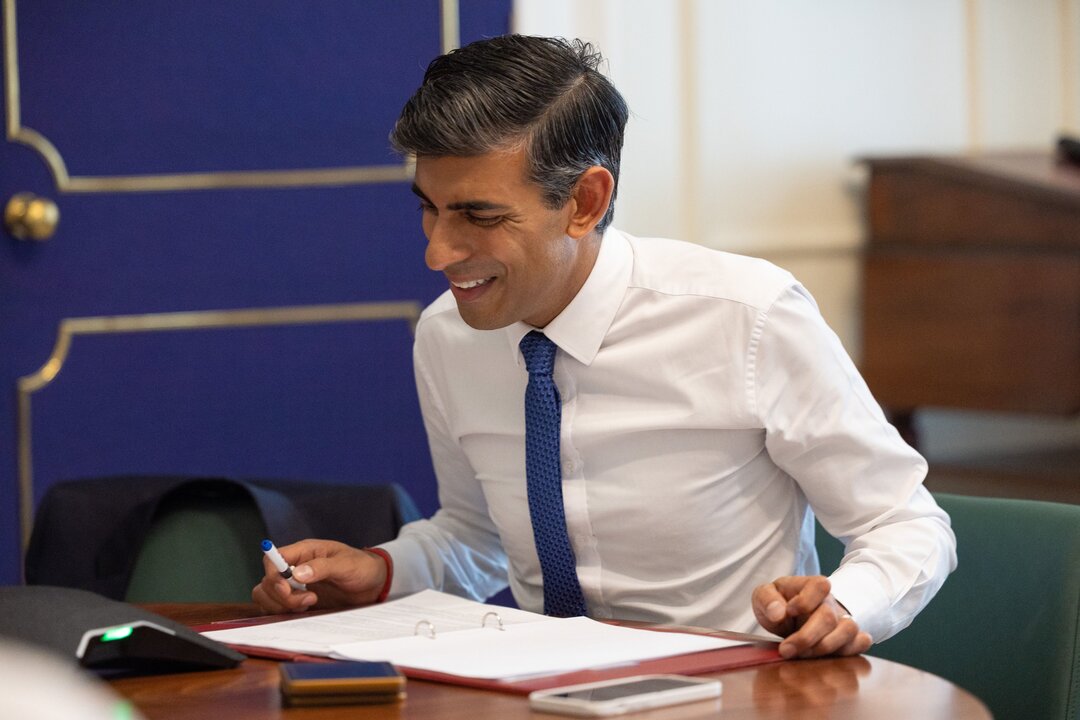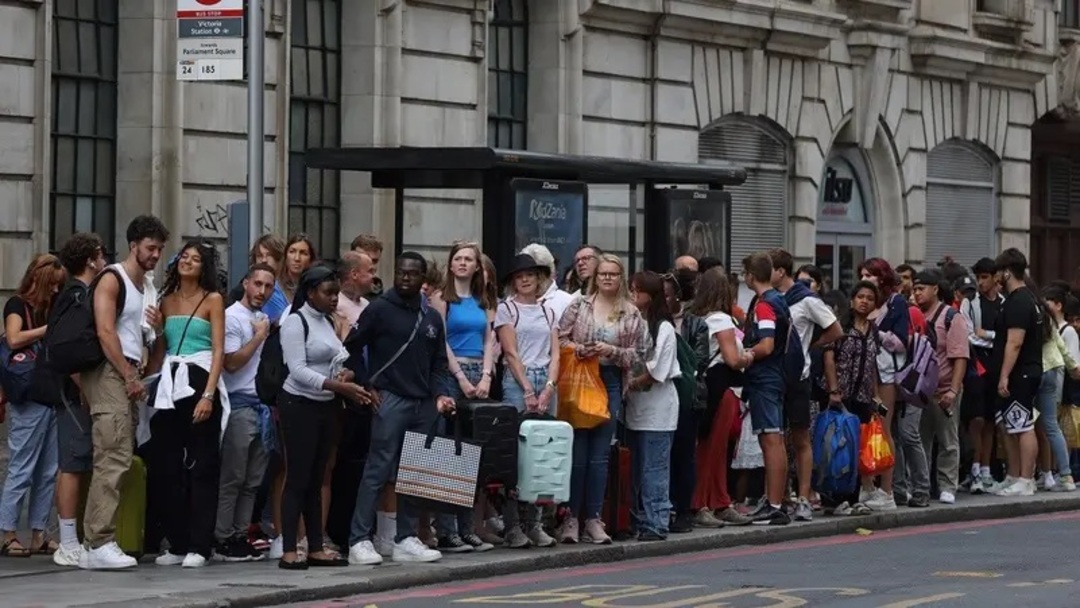-
UK PM Sunak has weak hand on strikes and should settle, economists say

Two senior economists warned the UK government is fighting a losing battle with unions over public-sector pay that will only extend strikes and delay wage inflation because the bargaining position of workers is too strong.
Charles Goodhart, a former Bank of England policy maker and professor at the London School of Economics, said politicians will condemn the UK not just to a “winter of discontent” reminiscent of the 1970s but “a year of discontent unless they agree a wage deal to end the ongoing industrial action.”
Savvas Savouri, chief economist at Toscafund Asset Management, said the government is “delusional if it believes it has “a strong hand against whichever union happens to be their adversary.
The views from the economists also feed into the debate about how to bring inflation under control after it jumped to a 41-year high of 11.1 percent.
The Bank of England has raised its benchmark lending rate to 3 percent last month and is expected to move again next week and in February to prevent a wage-price spiral. It’s called on employers to restrain pay demands, embedding the tightest cost-of-living squeeze on record.

Prime Minister Rishi Sunak’s position is unusually weak. After key workers were applauded for their service during the pandemic following years in which their pay had fallen behind the private sector, the public is sympathetic to the strikers’ demands. Also more than 600,000 workers have dropped out of the labor market since the pandemic, leaving employers struggling to fill vacancies.
Strikes are planned for every day until Christmas, with nurses, ambulance staff, teachers, rail and postal workers demanding pay rises to match inflation. They argue they’re seeing real-terms pay cuts after more than a decade of restraint.
UK commuters face disruptions as bus strikes begin in south, west London
The government has agreed 5 percent pay rises on average for public-sector workers, below the 6.8 percent average across the private sector, in an attempt to prevent a wage-price spiral and because the public finances are in a precarious state. Every 1 percent increase in public sector pay costs roughly £2.5 billion ($3 billion).
If the strikes continue, Savouri said the economy will suffer further supply shocks and staff shortages, and in itself will fan the pricing pressure that the government and Bank of England are trying to prevent.
“Wage growth will prove more stubborn, and so too inflation,” he said.
Similarly, Goodhart said the tide cannot be held back. The government’s stance “is not going to succeed, and it’s not going to last,” he told the Bank of England Watchers conference last week. A “public sector wage explosion is inevitable by 2025 at the very latest.”
Part of that is because government workers for years have been falling further behind their counterparts in the private sector on wages and pay raises.
Nurses in Britain prepare for unprecedented strike over pay
The government may well have to give way to fill vacancies, especially in the National Health Service, which is suffering chronic staff shortages. Pay restraint over the past decade has taken its toll on the ability of public services to retain staff.
In a note published Monday, Savouri said private employers are paying up “through gritted teeth and urged the government to follow suit.
The state should offer an 8 percent to 10 percent pay rise this year tied to a deal over the subsequent four years for a total increase across the five years of around 18 percent, he said. The arrangement would effectively mean fixing pay rises from 2 percent- 2.5 percent from 2024 to 2027.
His proposal would cost the government an extra £7.5 billion ($9 billion) to £12.5 billion (15.1 billion) this year, which is roughly the same as the extra headroom against its fiscal rules created by lower projected interest rates since the November autumn statement.
80% of Britain's trains expected to be cancelled due to strike
The Treasury declined to comment but pointed to cabinet minister Nadhim Zahawi’s statement to Sky News on Sunday.
“If you chase inflation — or above inflation — pay rises, then you embed inflation for longer and hurt the most vulnerable. This is not the time to strike but to negotiate,” he said.
Ministers have asked the independent Pay Review Bodies to make recommendations for next year’s awards, which will be announced in the summer.
A generous upfront deal would end economically damaging strikes and help ease labor shortages by “encouraging European Union nationals with settlement status who departed our shores at the onset of COVID lockdowns to return,” Savouri argued.
“The reality is we need to see a noticeable one-off rise in the wage level to quickly inject a fresh supply of workers into the UK,” Savouri said.
“This would deliver a host of disinflationary benefits, not least stopping supply-restricting – and thus inflation fueling – strike action.”
Goodhart said the government’s determination to pin down public sector pay was a “form of prices and incomes control” that is causing “all kinds of mayhem” – a combination of declining recruitment, worsening services and increasing industrial strife.
“The pressures imposed are so great there is going to have to be a public sector wage explosion, certainly no later than the next general election when the incoming government is going to have to rectify the distortions that are already there.”
The government must call an election by January 2025 at the latest.
Source: alarabiya
Tags
You May Also Like
Popular Posts
Caricature
BENEFIT Sponsors BuildHer...
- April 23, 2025
BENEFIT, the Kingdom’s innovator and leading company in Fintech and electronic financial transactions service, has sponsored the BuildHer CityHack 2025 Hackathon, a two-day event spearheaded by the College of Engineering and Technology at the Royal University for Women (RUW).
Aimed at secondary school students, the event brought together a distinguished group of academic professionals and technology experts to mentor and inspire young participants.
More than 100 high school students from across the Kingdom of Bahrain took part in the hackathon, which featured an intensive programme of training workshops and hands-on sessions. These activities were tailored to enhance participants’ critical thinking, collaborative problem-solving, and team-building capabilities, while also encouraging the development of practical and sustainable solutions to contemporary challenges using modern technological tools.
BENEFIT’s Chief Executive Mr. Abdulwahed AlJanahi, commented: “Our support for this educational hackathon reflects our long-term strategic vision to nurture the talents of emerging national youth and empower the next generation of accomplished female leaders in technology. By fostering creativity and innovation, we aim to contribute meaningfully to Bahrain’s comprehensive development goals and align with the aspirations outlined in the Kingdom’s Vision 2030—an ambition in which BENEFIT plays a central role.”
Professor Riyadh Yousif Hamzah, President of the Royal University for Women, commented: “This initiative reflects our commitment to advancing women in STEM fields. We're cultivating a generation of creative, solution-driven female leaders who will drive national development. Our partnership with BENEFIT exemplifies the powerful synergy between academia and private sector in supporting educational innovation.”
Hanan Abdulla Hasan, Senior Manager, PR & Communication at BENEFIT, said: “We are honoured to collaborate with RUW in supporting this remarkable technology-focused event. It highlights our commitment to social responsibility, and our ongoing efforts to enhance the digital and innovation capabilities of young Bahraini women and foster their ability to harness technological tools in the service of a smarter, more sustainable future.”
For his part, Dr. Humam ElAgha, Acting Dean of the College of Engineering and Technology at the University, said: “BuildHer CityHack 2025 embodies our hands-on approach to education. By tackling real-world problems through creative thinking and sustainable solutions, we're preparing women to thrive in the knowledge economy – a cornerstone of the University's vision.”
opinion
Report
ads
Newsletter
Subscribe to our mailing list to get the new updates!






















